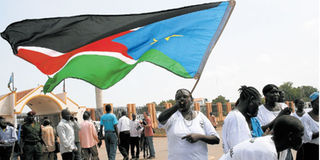Conflict dogs S. Sudan six months on

A woman waves a South Sudan flag during rehearsals for independence celebrations last July. PHOTO/ FILE | NATION
What you need to know:
- Internal rivalries and tensions with north have derailed nation building
JUBA, Saturday
Six months after the world’s youngest country euphorically declared its independence, South Sudan is riven by conflict, killings and ethnic tensions as it stumbles along the path of nation building.
Two decades of war with former enemies from the now rump state of north Sudan left the grossly underdeveloped south in ruins, awash with guns and rival militia forces, and split by bitter divisions between multiple tribes.
On Friday, a top official from the Jonglei region, claimed that thousands of people were killed in a wave of tribal violence last week.
Joshua Konyi, the commissioner for Pibor county in Jonglei state, said 3,141 people had been killed. UN and South Sudanese army officials have not confirmed the death toll, which would be the worst outbreak of ethnic violence ever seen in the fledgling nation.
Aside from internal conflict, South Sudan faces tensions in oil-rich regions along the still-undefined border with the north, with each side accusing the other of backing rebels and analysts warning of the risk of all-out war.
The most pressing issue for the new country, the size of Spain and Portugal combined but with few tarred roads outside the state capitals, “is without doubt that of security,” Giorgio Musso, a professor at the University of Genoa, said in an October paper.
Since independence, South Sudan’s ex-rebel army has succeeded in defeating several rebel leaders — killing some, while others negotiated surrender with their troops joining the bloated 100,000-strong military, itself divided along ethnic lines.
Nominal political agendas
Several of the remaining rebel forces have proffered nominal political agendas, many of them accusing the government of corruption, election rigging and of the domination of President Salva Kiir’s Dinka ethnic group over other tribes.
The south, which broke free on July 9, has repeatedly accused Khartoum of continuing civil war tactics of destabilising it by shipping arms to militia groups — claims denied by the north.
Historical enmities between rival groups were exacerbated by the war, while traditional societal structures were badly shaken by a youth brought up to rely on guns for survival.
“South Sudan has a traumatised population who are used to using violence as a method to solve their disputes, and it will be a long, slow process to change this attitude,” said long-time Sudan expert John Ashworth.
Building a new state takes time, but while South Sudan has made massive strides since the war ended seven years ago, on January 9, 2005, many still feel development has been too slow.
Rampant corruption and poorly educated civil servants compound the difficulties faced by a state struggling to support hundreds of thousands of people returning to the south from the north where they fled during the war.
Furthermore, difficult negotiations with Khartoum over pipeline fees to transport the south’s oil reserve — on which some 98 per cent of its budget relies — on the only available routes northwards, are stalled. But the south — which has huge agricultural potential as well as believed valuable mineral reserves — does offer a “bright future,” Ashworth said.
(AFP)




